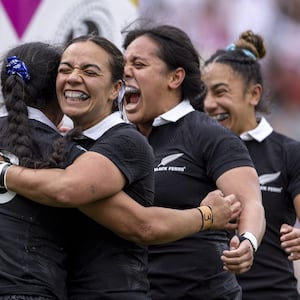Sports
National Unions Stand Firm Against Rugby360’s Influence on Women’s Rugby

The landscape of women’s rugby faces a pivotal change as eight national rugby unions have officially stated that players cannot participate in Rugby360 while representing their countries. This decision underscores the significant challenge that Rugby360 presents to the traditional rugby framework, especially with its lucrative contracts that could potentially offer players up to four times the salary of a typical Black Fern.
In a joint statement released this week, the rugby unions of New Zealand, Australia, South Africa, Ireland, England, Scotland, France, and Italy delineated their position. The unions emphasized that athletes must choose between playing for Rugby360 or their national teams, reinforcing the seriousness of the situation.
Mike Tindall, the former England rugby star, is behind Rugby360, a venture aimed at elevating women’s rugby through financial incentives and increased visibility. However, the initiative has faced criticism, including a notable incident involving the unauthorized use of Ilona Maher‘s image, which has raised ethical concerns regarding player agency and representation.
Financial Impact and Future Directions
Rugby360’s approach promises substantial financial rewards for players, which could dramatically reshape the women’s rugby scene. The contracts offered by Rugby360 have attracted attention due to their significant value, potentially leading to a talent drain from national teams. This financial model contrasts sharply with the current compensation structures in place for women’s rugby players participating in international competitions.
The announcement comes ahead of Rugby360’s planned draft in June 2026, which will reveal the athletes who will be signed for its inaugural season set to commence in early 2027. The draft is expected to feature prominent players from around the world, further intensifying competition among athletes and clubs.
The unified stance taken by these rugby unions reflects a growing concern over the potential implications of Rugby360’s model. By establishing a clear boundary, these unions are attempting to protect the integrity of their national programs and ensure that players prioritize their commitments to their countries.
As the situation develops, the impact on women’s rugby at both the grassroots and professional levels remains to be seen. The decisions made now could determine the future trajectory of the sport, as stakeholders weigh the benefits of financial incentives against their national loyalties.
With Rugby360 poised to reshape the competitive landscape, players, fans, and unions alike must navigate this emerging reality. As the sport evolves, the dialogue around player rights, representation, and compensation will likely continue to gain momentum, highlighting the need for a balanced approach to ensure the growth and sustainability of women’s rugby.
-

 World3 months ago
World3 months agoTest Your Knowledge: Take the Herald’s Afternoon Quiz Today
-

 Sports3 months ago
Sports3 months agoPM Faces Backlash from Fans During Netball Trophy Ceremony
-

 Lifestyle3 months ago
Lifestyle3 months agoDunedin Designers Win Top Award at Hokonui Fashion Event
-

 Sports3 months ago
Sports3 months agoLiam Lawson Launches New Era for Racing Bulls with Strong Start
-

 Lifestyle3 months ago
Lifestyle3 months agoDisney Fan Reveals Dress Code Tips for Park Visitors
-

 World3 months ago
World3 months agoCoalition Forms to Preserve Māori Wards in Hawke’s Bay
-

 Health3 months ago
Health3 months agoWalking Faster Offers Major Health Benefits for Older Adults
-

 Politics3 months ago
Politics3 months agoScots Rally with Humor and Music to Protest Trump’s Visit
-

 Top Stories3 months ago
Top Stories3 months agoUK and India Finalize Trade Deal to Boost Economic Ties
-

 World3 months ago
World3 months agoHuntly Begins Water Pipe Flushing to Resolve Brown Water Issue
-

 Entertainment3 months ago
Entertainment3 months agoExperience the Excitement of ‘Chief of War’ in Oʻahu
-

 Science3 months ago
Science3 months agoNew Interactive Map Reveals Wairarapa Valley’s Geological Secrets









